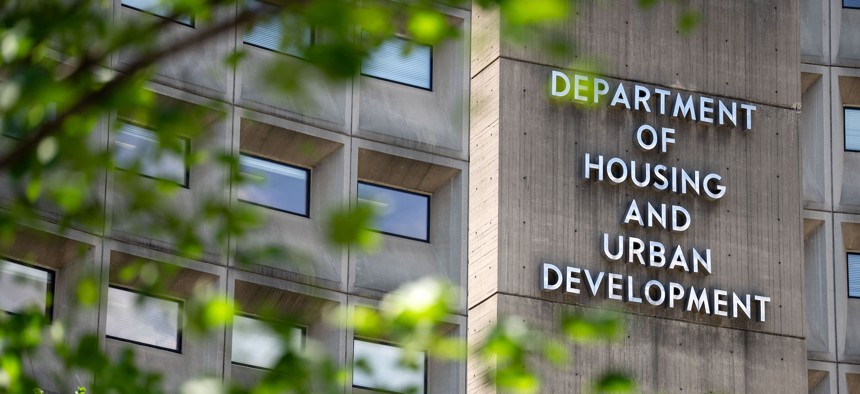
HUD has until Sept. 30 to obligate $75 million in grants meant to address homelessness. Kent Nishimura / Getty Images
HUD asked grantees to apply for soon-to-be-expired funding 3 separate times. Democrats want a watchdog review.
President Donald Trump recently replaced the acting head of the Housing and Urban Development Department’s inspector general office, which would look into the matter.
Updated at 6:20 p.m. ET Sept. 12
Two senior Democrats on the Senate Appropriations Committee on Thursday requested that the inspector general for the Housing and Urban Development Department review the circumstances that led to certain grantees being asked to submit three different applications for undistributed funding that expires on Sept. 30.
In their letter, Appropriations panel vice chair Patty Murray, D-Wash., and Kirsten Gillibrand, D-N.Y., who is the ranking member on the subcommittee with jurisdiction over HUD, wrote that the Biden administration had nearly completed the applicant selection process for $175 million in Continuum of Care Builds grants. Such funding is used to construct, acquire or rehabilitate permanent supportive housing for people experiencing homelessness.
The Trump administration, however, on May 16 published a new application request for only $75 million in CoC Builds grants. (That amount reflects just funding for fiscal 2023. For the following fiscal year, Congress provided another $100 million.)
While HUD notified Congress on Aug. 5 that it had selected 14 projects to receive such funding, officials on Sept. 5 informed potential grantees that they need to reapply by Friday. HUD has until Sept. 30, which is the last day of the fiscal year, to obligate the grants.
“HUD’s unpredictable and capricious decision-making has put a tremendous burden on local community organizations, requiring staff to apply, reapply and then reapply again for the same amount of funding — each time with different rules and with less time to apply,” Murray and Gillibrand wrote. “Running three separate and very different funding competitions for the same set of funds is inefficient, wasteful and no way to run any program. This administration has now wasted hundreds of hours of local organizations’ time that could — and should — have been spent working to address homelessness.”
When announcing that it was issuing a new application request, HUD said it was due to two Trump executive orders: one signed on July 24 that seeks to “[shift] homeless individuals into long-term institutional settings for humane treatment through the appropriate use of civil commitment” and another enacted on Aug. 7 to require political appointees to sign off on all grants to ensure they comply with administration policy.
The National Alliance to End Homelessness and Women’s Development Corporation, both nonprofits, on Thursday filed a lawsuit challenging the new conditions placed on the grant funding pursuant to the executive orders.
“Under the new funding application rules, service providers and communities are blocked from applying for federal housing funds for new permanent supportive housing for individuals and families experiencing homelessness if they operate in jurisdictions with policies the Trump-Vance administration disfavors,” according to a National Alliance to End Homelessness press release. “This includes states and cities with sanctuary protections; those that provide services considered ‘harm reduction,’ such as safe drug use criteria practices; or those that have inclusive policies for transgender people.”
A federal judge on Friday issued a temporary restraining order blocking such new conditions.
Murray and Gillibrand requested that the HUD IG office review whether the multiple application requests violated federal law or constituted fraud, waste, abuse or mismanagement. OIG officials on Friday confirmed that they received and would consider the request.
HUD did not respond to a request for comment.
Leadership Shakeup
Trump recently replaced the head of HUD’s OIG. On July 10, the president notified Congress that he would name Brian Harrison to be acting leader of the office. Harrison, who has served in three different IG offices, assumed the position on Aug. 12. The president is permitted to appoint acting IGs, so long as they’re already an employee at any OIG.
The president fired HUD IG Rae Oliver Davis at the start of his second term as part of a mass removal of the watchdogs. As a result, deputy HUD IG Stephen M. Begg took over as acting leader until he was replaced with Harrison. The OIG informed Government Executive that Begg is no longer with the office.
The White House did not respond to a request for comment about why the president replaced the acting leader of HUD’s OIG. Trump nominated Jeremy Ellis — who has more than two decades of investigative experience, according to the National Housing and Rehabilitation Association — for the permanent position.
Trump also recently replaced the acting heads of the OIGs for the Education and Commerce departments.
This story has been updated with a judge's order in the case over HUD's grant funding.
Share your news tips with us: Sean Michael Newhouse: snewhouse@govexec.com, Signal: seanthenewsboy.45
NEXT STORY: Oversight of contract security guards at federal buildings is the focus of a House-passed bill







